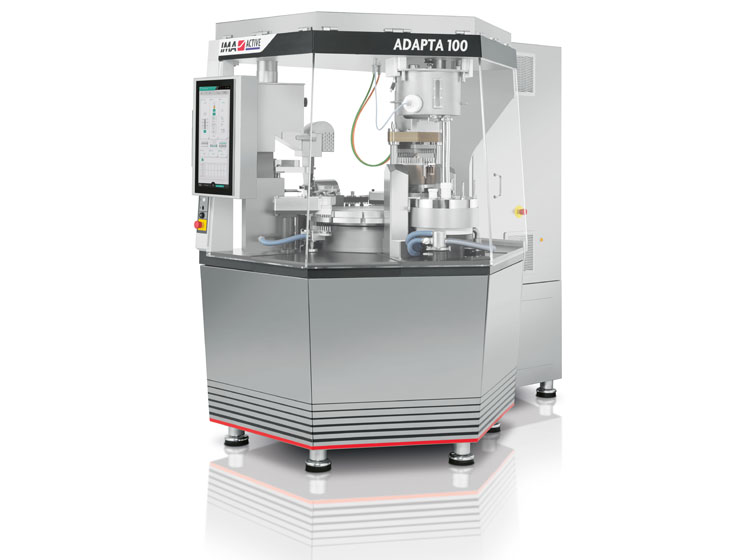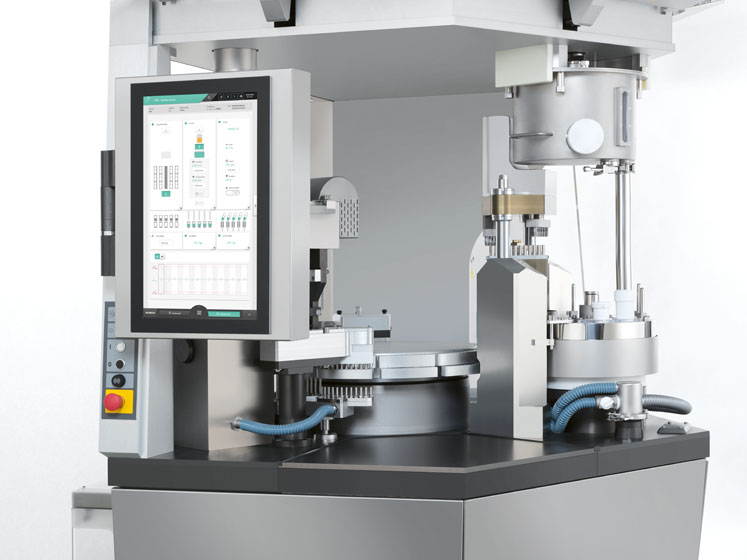Established in 1949, Famar is a leading European provider of pharmaceutical manufacturing and development services. For 70 years, the company has been a reliable supplier of flexible solutions — from development to production and distribution — for a wide range of pharmaceutical and consumer care products.
With time, Famar has expanded its business and today boasts a network of six production sites and three research and development (R&D) centres in Europe. The organisation is able to supply a broad array of more than 1800 products in a variety of dosage forms in 80 international markets, providing development, manufacturing, quality, regulatory and logistics services.
In Italy, the Famar Business Unit is located in Baranzate (Milan) where a variety of oral solid dosage forms (hard gelatin capsules, coated and uncoated tablets, sugar-coated tablets, effervescents, powders, granules and pellets) are produced.
One of the company’s latest investments is an IMA Adapta 100 capsule filling machine, which is able to produce up to 100,000 capsules/hour.
Besides excellent accessibility, the machine allows operators to dose up to five products into the same capsule thanks to its exceptional design flexibility; it also ensures maximum dosing precision and reliability — even when filling product combinations or being used for powder microdosing.

“Customers see our Business Unit as a producer and supplier of high-quality pharmaceutical products and services — on time, in full — at competitive rates and in a sustainable way,” states Michele Vite, Production and Product Transfer Manager.
“We were about to receive a transfer for a very tough product that needed to be dosed in capsules. So, we started looking for a capsule filler that would be able to dose that kind of product.”
KSR: What were the basic requirements that the capsule machine needed to have?
MV: As stated, at the time of purchase, we were facing a request for an intercompany transfer for a very tough product. So, basically, the capsule filler we were looking for needed to have three main characteristics:
- the ability to dose two different kinds of powder into the same capsule
- the ability to manage high plug hardness: one layer of the powder required a mandatory plug hardness in an unusual range to comply with a specific dissolution profile (modified release)
- the ability to achieve high production rates; our goal was 100,000 capsules/hour.
KSR: What were the most important aspects of the product to be dosed into the capsules?
MV: There were two critical issues relating to the product. The first was that two different powders had to be dosed into the same capsule. The second and most tricky hurdle to overcome was the plug hardness (up to 100 N) of one of the powders.
As a result, we were looking for a capsule filler that would be able to manage this kind of force, ensure final product quality and also deliver high performance in terms of production rates.
KSR: What was your main reason for choosing the Adapta 100?
ER: To be honest, IMA was not our first choice for this project. We investigated several different options and conducted numerous tests. As Michele mentioned, the product that had to be filled into the capsules posed a few problems.
In the end, we chose the Adapta for three main reasons. The first one is the operational speeds that can be obtained — even in a multilayer configuration. The Adapta offers high production rates even when we dose more than one product into the same capsule.
Our tests demonstrated that the Adapta was 50% faster than other capsule fillers on the market when using a multilayer configuration. The second reason is the Adapta’s flexibility and ability to dose up to five products into the same capsule.
Moreover, its dosing units can be easily removed and are interchangeable, making it possible to “plug and play” between different machine configurations and filling combinations (powders, pellets, minitablets, tablets, capsules). In the end, as well as being a flexible machine, it’s also user-friendly and easy to use.
Plus, once the machine doors are opened, the working area is completely accessible, making cleaning operations very easy.
KSR: What are the three most valuable features of the machine?
MV: That’s an easy question to answer! First, it’s reliable. We can confidently produce high-quality capsules even in the most difficult conditions. Secondly, the machine is easy to use; changeover times are rapid and maintenance procedures can be done quickly and easily. In addition, the IMA service hot line is always available when needed.
Finally, the Adapta benefits from high-quality construction (all the build materials are fully compliant with GMP and US FDA regulations).

KSR: Can you comment on your collaboration with IMA?
ER: For Famar’s Baranzate team, IMA is known to be a significant and well-known company in the industry, but one that we had never used in the past. The key to the success of our collaboration with the IMA team can be split into two important aspects.
First of all, cost. The solution that IMA quoted to us was very much in the range that we expected. However, they made a strong commercial effort to propose a more competitive final price. After the installation process, I want to emphasise how hugely proactive the IMA after-sales team was.
The machine needed improvements to reach the expected plug hardness: IMA service, as a first response, enabled us to produce the validation batches of the product in time (with quick and successful changes) and, in just a few weeks, changed the specifications of the machine itself — adapting the mechanical parts at the core of the process to the needs of the powder we were using. In summary, IMA delivered
- attentive support during the verification of the results after the first production batches, thanks to the constant support of lab technologists
- technical intervention in terms of the machine itself with professional and well-trained technicians
- innovative solutions and modifications were introduced to reach the goals expected by Famar’s customer
- a very positive approach, IMA’s flexible and open-minded technical experts were willing and keen to accept our advice and focused on making core changes as opposed to simple technical repairs
- good cost management.
KSR: What are your plans for the future?
MV: We have successfully expanded our production capacity and, to support this trend, we plan to increase our operational efficiency and capabilities in several production areas. We’re also introducing ATEX compatibility to produce oral solid dosage forms made with non-aqueous solutions.
